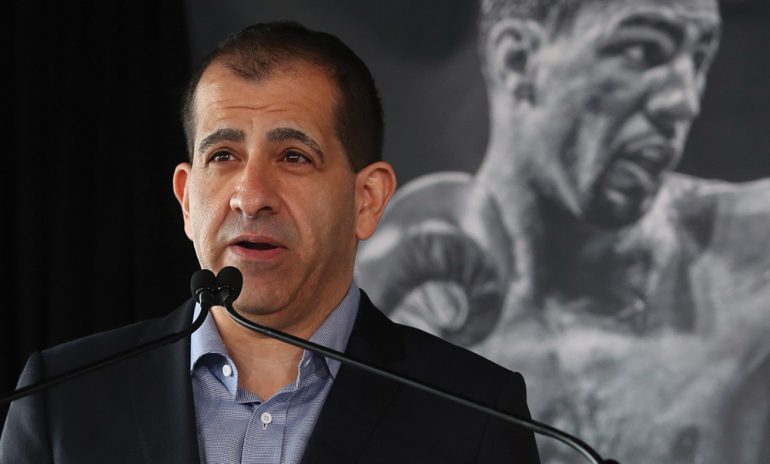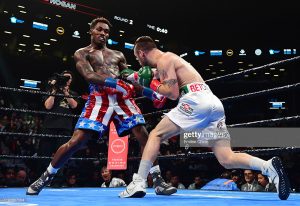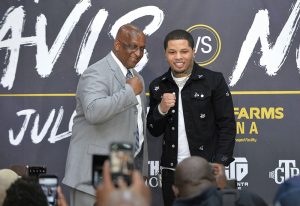The Standard-Bearer: SHOWTIME BOSS STEPHEN ESPINOZA GIVES HIS PROJECTIONS FOR TELEVISED BOXING

This story appeared in the April 2020 issue of Ring.
Boxing on TV has undergone a metamorphosis in recent years. ESPN expanded its role from a bit player to a major player. New streaming network DAZN made a huge splash in corralling boxing’s No. 1 fighter, Canelo Alvarez, and Fox Sports made a huge commitment to further expand the role it established in 2018.
Watching by the wayside is now the old stalwart – Showtime. It wasn’t that long ago that the cable-subscription network played the little brother to HBO. But with HBO dropping boxing in 2018 after 45 years in the sport, Showtime and its president of sports and event programming, Stephen Espinoza, find themselves the grizzled veteran on the TV boxing block.
Espinoza, who’s in his ninth year with Showtime, has done wonders in the time he’s been there. He made Floyd Mayweather the face of boxing, signing him to a multi-year, six-fight deal worth hundreds of millions, and he supervised three of the highest-profile fights – and highest grossing – in boxing history: Mayweather-Alvarez (2013), Mayweather-Manny Pacquiao (2015) and Mayweather-Conor McGregor (2017).
“I think one of the things that makes Stephen different from other TV executives in the sport is that not only does he know boxing, he loves boxing,” said Steve Farhood, Showtime’s Hall of Fame announcer. “I’ve known Stephen since he came on board at Showtime in 2011. He’s a great leader.”
No one in the boxing industry would contest that.
But Espinoza is uncertain about how boxing evolves from this point, as are other TV executives faced with moving it forward, presumably. It was one of the many juicy topics Espinoza discussed in an interview with The Ring prior to the network’s first televised fight of 2020.
‘We are the established incumbent. We are currently the longest-running boxing program in the sport. We’re the establishment, and with that comes higher expectations.
THE RING: How did you feel about 2019?
STEPHEN ESPINOZA: To be candid, 2019 was a strange year. Maybe that was foreseeable or should have been foreseeable coming into the year with all of the change going on. We had HBO getting out of the business and a couple of new entrants coming in, with ESPN expanding to a different level.
I think everybody was sort of finding their way, week by week, month by month. I think, to be completely candid, the product across the board reflected that. It was really inconsistent. You can look at every platform and say some had great fights and some had not-so-great fights. I think that’s a result of uncertainty.
Not knowing strategies, not knowing the players and where they’re going is the reason. I think with certainty and a little more familiarity, I think everyone is going to have a better year. That’s good news for the fans and for the sport in 2020.
RING: How would you rate Showtime’s 2019?
SE: I think we suffered because we were coming off arguably our two strongest years in 2017 and 2018. It was almost inevitable that we weren’t going to be able to continue that run forever, as much as we would have liked to.
Then you add in the uncertainty. There are some fights that didn’t come together at all. There were some fights that came together differently than we expected them to. There is a lot of competition and not a lot of rationality in the marketplace. There are a lot of deals being made which don’t really correspond to viewership, to demand in the market, and just a lot of money being thrown around.
I’m the last person who would begrudge fighters getting paid. I think that’s a great thing. But in terms of the certainty in the marketplace and being able to plan ahead a month or two, it causes chaos.
RING: What do you project for 2020?
SE: I think we’re already seeing, at least in respect to the Showtime programming, that it is stabilizing and getting to a more consistent level of quality.
I think you could see a timeline starting with December 7 (2019). We had the Jermall Charlo fight, with a really good co-feature with Chris Eubank Jr. and Matt Korobov. For reasons that we didn’t have anything to do with, the Eubank-Korobov fight didn’t come out the way everyone had hoped (because Korobov suffered a shoulder injury in the second round).
Then you go to December 28. (Gervonta) Tank Davis is Tank Davis, who is really maturing into a star. That had a really good co-feature with Jean Pascal and Badou Jack, and there was no way that wasn’t going to be a good fight.
Then we started January 25, and we had Danny Garcia (and) Jarrett Hurd (in separate fights), and then there is Stephen Fulton, who has looked really good.

Showtime kicked off 2020 with 160-pound titleholder Jermall Charlo headlining Championship Boxing. (Photo by Emilee Chinn/Getty Images)
RING: Now you guys are the old dog on the block. You find yourself the standard that everyone else measures themselves against.
SE: That’s a really insightful comment. We are the established incumbent. We are currently the longest-running boxing program in the sport. We’re the establishment, and with that comes higher expectations, which are absolutely true. That should be the case, and with that we’re going to be attracting the bulk of the fire. That’s fine. We are a target. The key is that we need to continue setting the standard on the production level, and that means all levels. It means the announcers, with the production value, but also how we organize, deliver and promote the sport.
That’s one of the negative consequences of the rapid expansion of content. It’s a lot of fights. For the hardcore fan, it’s great. But I’m on record saying it’s not a good thing. There are a lot of fights happening where there doesn’t seem to be a standard of quality. There’s someone saying, “Sure, you want to put on a fight, we’ll put it on our air.” I don’t think it’s good for the sport or good for the audience. I wonder, with this greater level of activity, are we putting a strain on our pool of boxers in terms of safety issues? Using guys more frequently puts them under greater stress.
There’s no secret that 2019 was a terrible year, and the worst year in recent memory in terms of fighter injuries and deaths in the ring. No one wants to see a repeat of that. I think the amount of boxing and demand for opponents plays into that.
I also think that when you’re launching new streaming services, you need hours, you need content, you need filler, and you end up putting on a fight at 4 in the morning from Tokyo, and here’s some Irish ShoBox-level fighters to watch. Yes, the hardcore fans like that. But does it refine and grow the boxing audience? I don’t think it does.
RING: Showtime does have a step up in production over the other boxing TV platforms. Showtime has Hall of Famers like Steve Farhood, Jim Gray, Al Bernstein and Barry Tompkins. How much easier does that make your job?
SE: The Lakers way back fielded a team of All-Stars, but they were a bunch of names. No chemistry. We have chemistry. Mauro Ranallo and Paulie Malignaggi working with Al, there is a balance of energy there. We have a really good team.
RING: What are you looking forward to in 2020?
SE: One of the things that I’m encouraged by is seeing the emergence of a guy like Gervonta Davis. We certainly don’t like losing “stars,” like Floyd Mayweather retires or Canelo Alvarez decides to go somewhere else or when Deontay Wilder takes a couple of fights on Fox. What is reassuring is that the beat goes on. It continues. We have demonstrated the ability to establish and develop stars. It’s one of the knocks we took when I first started. We weren’t known for developing careers and breaking stars. We don’t hear that anymore.

Showtime has big plans for 135-pound attraction Gervonta Davis, pictured with Baltimore mayor Bernard Young at a fan rally last June. (Kevin Richardson/Baltimore Sun/Tribune News Service via Getty Images)
RING: I think what helps Showtime is that you have boxing people who are broadcasters, and they have a keen eye for talent.
SE: There’s a history there. Some of our marketing people have marketed the Mike Tysons, Evander Holyfields, Julio Cesar Chavez through Diego Corrales and the Corrales-Jose Luis Castillo fight, to Floyd Mayweather to today. There is institutional knowledge that is second to none.
When all of those other services go looking for young employees, they poach ours. That’s an established fact. It’s a pain in my ass, but it’s also the highest compliment. That’s because we not only develop boxing talent, we develop employees who know the sport and care about the sport as well.
RING: How frustrating is that, and how do you deal with it? Because Showtime also built Deontay Wilder, who you now share with Fox.
SE: At a certain level with Fox, and let’s be explicit about it, they’re coming into this having no recent history in the sport. The only place that they were going to get main-event fighters were fighters that we established.
One of the big questions I have is: Are they going to be able to develop stars of their own? I think that’s critical to the health of the sport overall. Not to just take guys we develop, but to take someone from an FS1 card and develop them into a headliner all of the way to pay-per-view. If they can do that, it’s great for the sport.
In the meantime, yes, it is frustrating. But I understand. If someone is out there throwing around what we consider foolish money, and there are multiple parties doing that, it’s money that is going to result in losses of 10, 15 million. It’s tough to say that loyalty means you don’t take silly money sometimes.
The reason why you haven’t seen a large defection to DAZN is because, among other things, people know the visibility of their events, and their career drops significantly once they move to DAZN. That’s why all money isn’t good money. It might make sense to go there and take a big check. Other fighters can’t afford to disappear for a year or 18 months, even if they’re going to make a few million.
We’re going to win our share of those battles to retain and attract the stars based on our track record, which is making the biggest events literally in the history of the sport. Fighters are going to come and go, but we’re continuing to develop new stars, which is great for the sport and great for the network.
RING: How stable is Showtime’s footing?
SE: To be completely candid, it’s more stable than virtually every other platform that’s out there today. That’s partially because of our history. That’s partially because of our senior executives’ commitment to the sport. And most of all because the sport still drives business for us.
‘When I look at other platforms, I see we are in this sport as an end to itself. This is not a stepping-stone.’
We’re not completely open with all of the factors that go into that decision, but coming off an event like Tank’s fight in December, which can be measured in any different number of ways – from viewership to digital streaming to social media to more intangibles – suffice to say an event like that drives business. The day in which big events like that do not make a splash, then we’re going to have trouble justifying staying in the sport.
That’s not at all where we are. And it’s where we’re trending. So, this narrative about we’re approaching the end of our time, I have zero concern about that. Anyone who knows me, if I had some concerns, I wouldn’t sit here and lie to you about it.
Right now, there is a firm commitment to the sport. We’re now part of Viacom, which already has its commitment to combat sports with (MMA company) Bellator, and there are a lot of synergies there in terms of cross-promotion and marketing. There’s an appreciation for live sports and live combat sports.
When I look at other platforms, I see we are in this sport as an end to itself. This is not a stepping-stone. This is a proof of concept for us. This is not an experiment to replace some other programming that we lost. Our viewership is what it is, and we don’t cover it up by coming up with some worldwide viewership numbers like 10 million hours of viewership. What does that mean? It’s nothing. It’s a number devoid of context to answer questions about why you don’t give your viewership (statistics).
RING: What fallacies do you believe are out there?
SE: I think there is a lot of misconception about viewership and the relative value of viewership. We don’t monetize viewership. Certainly viewership is important, because it shows people are interested in what we put on the air. But unlike Fox or ESPN, we’re not dependent on it for revenues. I think viewership is great for exposure, but can they develop those numbers into stars? OK, it might be phenomenal marketing, but has it moved the needle in terms of pay-per-view? I haven’t seen it. I would love to be doing two million viewers on our shows. But I’m happy we’re doing, generally speaking, what is equivalent viewership to what ESPN is doing, with one-third of the homes. All of us, no matter what the platform, are doing significantly more than DAZN.
I don’t know how we got into this world of needing to criticize everyone else’s platform in order to promote your own, and it’s a chicken-and-the-egg thing. Once a couple of guys do it, I have to answer, and it turns into an endless cycle. When CBS has a great NFL game, nobody from Fox or ESPN tries to tear them down and point out holes in the ratings. What is good for the sport on one network is good for the sport overall.
I’m not rooting for the failure of any of these platforms. What I’m rooting for is a rational, positive, long-term commitment to elevating the sport from all of them. If that is the case, we’re all better off, and there’s plenty of good content for everyone to go around.
RING: What I feel is one of the most underrated boxing programs is Showtime’s ShoBox. All it does is keep boxing at the grassroots level where it needs to grow.
SE: I couldn’t agree more. ShoBox is the strongest brand in the sport of boxing today. There isn’t another platform or series that boxing fans know exactly what they’re going to get, day in and day out. If you’re paying attention, you know what you’re going to see when you watch ShoBox. It’s prospects in crossroads fights, and sometimes those prospects lose.
I give all of the credit in the world to Gordon Hall and his team. Gordon is beyond diligent in making sure these are tough matchups. This is a series that has consistently identified and developed future superstars, and there isn’t anyone else in the sport that has made the commitment to make that work. It’s not always sexy. None of it is easy. I mean, we’re talking about going to places like Shelton, Washington, or Sloan, Iowa – it’s a haul to get there. But everyone who works on that series has a commitment to that series, and they have a belief in what that series does. There’s nothing else like it in the sport.
RING: Talk about your evolution.
SE: It seems like a million years ago that I started. There are honestly things I could have never predicted, like breaking the pay-per-view record. To be consistently delivering the highest quality of boxing, it’s a blessing to have the commitment of the corporation, and it’s not as simple as “make the best fights and throw them on the screen.”
RING: Any dream fights for 2020?
SE: I’ll break this down by categories. I would like to see a signature fight for Gervonta Davis. We’ve done some successful events with him, and everyone wants to see how high the ceiling is with him. How good is he? They want to see him get tested. Just like a few years back, when Wilder fought Luis Ortiz. Let’s see what we have.
I’ve been saying this for a few years, but I would like to see unification at 154. We won’t get all of it, but we’ll have a significant piece of it. I’d also like to see it at 160. I also recognize the value of having one champion in some divisions. I think we can see that in 2020.
RING: So, boxing isn’t dead at Showtime?
SE: No, I wouldn’t be selling Showtime boxing stock right now. We’re excited about where we’re going. There’s always competition and there are always challenges. But I like that. I didn’t give up my law practice and move to New York to not compete at the highest level. I would rather fail spectacularly than not try.
In these next few years, we’re either going to be a great success or a spectacular car crash, flameout ending. I’m fine with either. I prefer one over the other, but what the car crash, flameout ending would mean is we aimed high and we fell short.
So far, I think we’re on the right track.
READ THE LATEST ISSUE OF THE RING FOR FREE VIA THE NEW APP NOW. SUBSCRIBE NOW TO ACCESS MORE THAN 10 YEARS OF BACK ISSUES.















